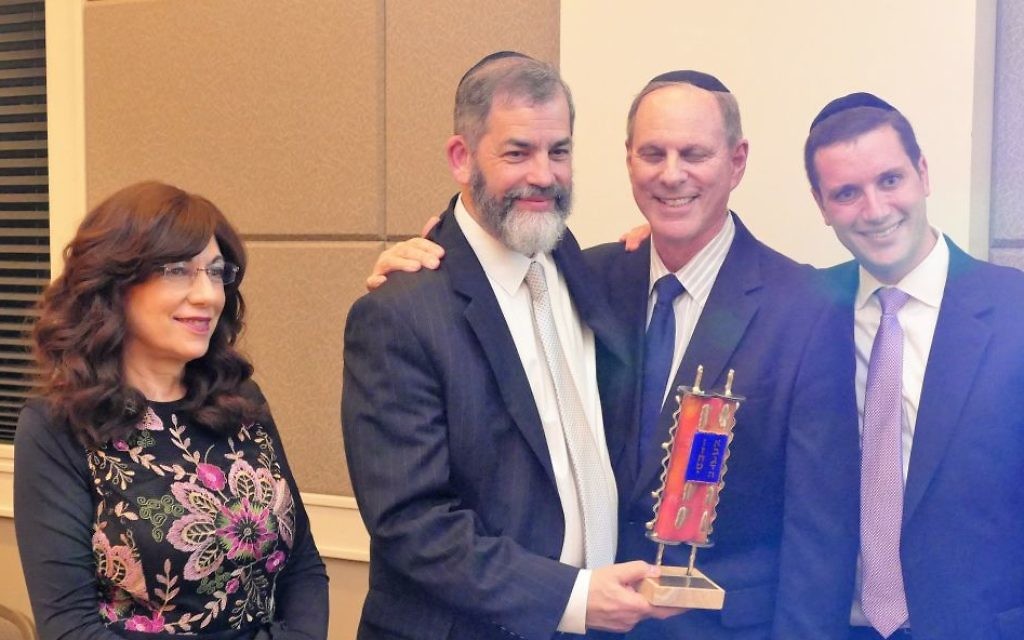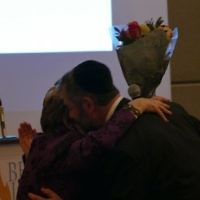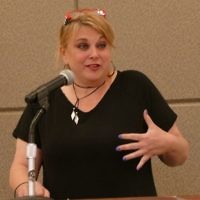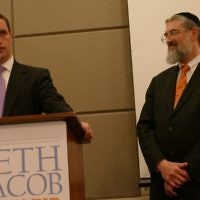Beth Jacob Celebrates Feldmans’ Leadership
The synagogue's annual tribute dinner marks a quarter-century under Rabbi Ilan Feldman and his wife, Miriam.

Rabbi Ilan Feldman says he never needs Google to remember the date of the coup against Mikhail Gorbachev that marked the beginning of the end of the Soviet Union: Aug. 18, 1991.
It’s the same day he was installed as Congregation Beth Jacob’s senior rabbi after 11 years as the assistant to his father, Rabbi Emanuel Feldman. He told his father he accomplished in six hours what he couldn’t do in 40 years.
In sharing that story Sunday night, May 14, during Beth Jacob’s honor dinner celebrating the first 25 years of the leadership of the shul’s second Rabbi Feldman and his wife, Temima High School Principal Miriam Feldman, the rabbi also offered a lesson.
Get The AJT Newsletter by email and never miss our top stories Free Sign Up

“There’s no way this is about the rabbi,” he said. “This is about the shul.”
He paid tribute to a few of the many people who have been crucial to Beth Jacob the past quarter-century, from his first hire, Sybil Goldstein, who has filled any role necessary over the years, to Chana Shapiro, whom he stole from the Atlanta Jewish Community Center to fulfill a vision of Beth Jacob as the center of the community and not just a place of worship, to Rabbi Norman Schloss, “a gabbai’s gabbai.”
Two such people shared the spotlight at the dinner as tireless volunteers for the Beth Jacob community: Woman of the Year Jodi Wittenberg and Man of the Year Mike Cenker.
“It’s a privilege to be able to serve and to live and to raise a family in a community that I myself was raised in, and it’s a privilege particularly in this shul, which has achieved around the world a unique status as a spiritual center, a collection of people who will not announce a limit on where they will go, on where they will stop,” Rabbi Feldman said.
He said the congregation is a successful experiment in what happens when you bring together Jews from a range of backgrounds, educations and levels of observance with a reverence for Torah and respect for the centrality of G-d to unite them.
Jewish communities around the country call on Rabbi Feldman for advice on how they can re-create what Beth Jacob has, he said.

“I know that his community can become a model for other communities,” Rabbi Emanuel Feldman said during his tribute to his son and daughter-in-law, without whom, he said, Atlanta wouldn’t have Torah Day School, Temima, the Atlanta Scholars Kollel and so many other core institutions.
It’s a family tradition that goes back to the earlier generation: Rabbi Emanuel Feldman brought the community to Toco Hills, for example, and his wife, Estelle, was one of the first teachers at the Hebrew Academy.

The next generation, Rabbi Avraham Chaim Leib Feldman, the third of the honorees’ eight children, said one of the keys to his parents is that just as they expect the community to keep growing spiritually, so they never tire of growing.
To that end, Rabbi Ilan Feldman used a lesson from Maimonides’ son — “another person who probably had to go through psychotherapy” to live up to his father — to help his congregation get the most out of his big night.
The Rambam’s son, Avraham, taught that there were three rising levels to Shabbat observance: Keep it because G-d created the world and rested on the seventh day; keep it because you’re overwhelmed as you look around at the magnificence of creation; and keep it as an expression of the exclusive relationship between G-d and the children of Israel.
Similarly, Rabbi Feldman suggested three ways to participate in the dinner: Show up to honor the rabbi and his wife for 25 years of service; appreciate what the rabbi and the congregation have shared as their souls have merged; and recognize that there is a partnership representing “the last remnants of the Jewish people, that we exist in a post-Holocaust century where almost the entire Jewish world is ignorant of what it means to be Jewish.”

“You and I, we have an idea, and we’re passionate about it,” Rabbi Feldman said. “If we don’t fulfill our responsibility to the rest of the world, who will? … The world has no idea what it is to be a human being, what it is to be dignified, what it is for relationships to be sanctified, what it is for a human being to reflect the nature of the Creator Himself in our daily behavior.”
All of that, he said, is what it means to be a Jew.
-

- Rabbi Ilan Feldman pulls off a surprise by giving his mother, Estelle, flowers during his speech accepting the congregational award. Although his father earlier had joked that Mother’s Day was over because it was after dark, Rabbi Feldman declared that it’s the custom of Beth Jacob to observe Mother’s Day until midnight.






comments